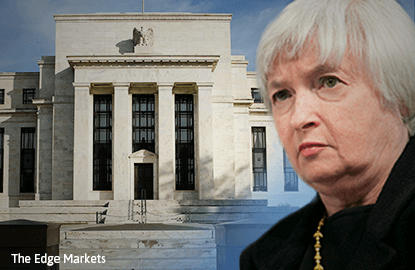
WASHINGTON (Jan 20): Federal Reserve Chair Janet Yellen backed a strategy for gradually raising interest rates, arguing that the central bank wasn’t behind the curve in containing inflation pressures but nevertheless can’t afford to allow the economy to run too hot.
“I consider it prudent to adjust the stance of monetary policy gradually over time,” she said Thursday in the text of remarks to the Stanford Institute for Economic Policy Research in California, while stressing the considerable doubt surrounding that outlook.
Yellen’s second speech this week comes just a day before the inauguration of Donald Trump as US president. She said that future alterations in fiscal policy were just one of the many uncertainties that the Fed would have to grapple with as it plots its monetary moves in the months ahead.
Not only is the size, timing and composition of such changes unclear, estimates of their impact on the economy by budget experts vary considerably, she noted in a footnote to the speech.
In making the case that the Fed had not fallen behind the curve, Yellen said that wages had risen “only modestly” and the manufacturing sector was operating well below capacity.
‘Seems Unlikely’
What’s more, she didn’t see that changing soon. Payroll growth has slowed while the economic expansion “seems unlikely to pick up markedly in the near term” given weak foreign demand and prospective gradual increases in interest rates, she said.
Still, she saw dangers in permitting the economy to overheat and inflation expectations to get out of control. “Allowing the economy to run markedly and persistently ‘hot’ would be risky and unwise,” she said.
Another factor arguing for a gradual approach to raising interest rates is what Yellen called a “passive” removal of monetary accommodation via the Fed’s balance sheet.
In another footnote to her speech, Yellen said a shortening in the average maturity of the central bank’s bond holdings and the approach of an eventual reduction in its balance sheet could increase the yield on the 10-year Treasury note by 15 basis points this year. That would be roughly equivalent to two 25 basis point increase in the inter-bank federal funds rate.
The Fed raised interest rates in December for the first time in a year, lifting its target range for the benchmark federal funds rate to 0.5% to 0.75%. Policy makers have penciled in three quarter-point increases for this year, according to the median of the quarterly estimates in December.
Dual Mandate
Yellen spelled out in detail a point that she also made in her shorter speech on Wednesday, namely, that the Fed was close to achieving its goals of full employment and stable prices.
The jobless rate stood at 4.7% in December, slightly below the level most Fed policy makers view as full employment.
“In the coming months, I expect some further strengthening in labor market conditions as the economy continues to expand at a moderate pace,” Yellen said.
The “strong labor market” should help lift inflation to the Fed’s 2% goal over the next couple of years, she added.
As measured by the personal consumption expenditure price index, inflation rose 1.4% in the 12 months through November. That’s up markedly from 0.5% on the same basis in November 2015, in part because of a rebound in oil prices.
Yellen spent much of her speech discussing the benefits and drawbacks of using simple rules to guide monetary policy, such as one developed by John Taylor, a scholar at the Stanford Institute and a professor at Stanford University.
While such rules can serve as “useful benchmarks”, they often do not take into account important factors potentially affecting the economic outlook, such as fiscal policy, she said.
Given all the uncertainties, determining how best to adjust interest rates to sustain a strong jobs market while maintaining low and stable inflation “will not be easy,” Yellen said.